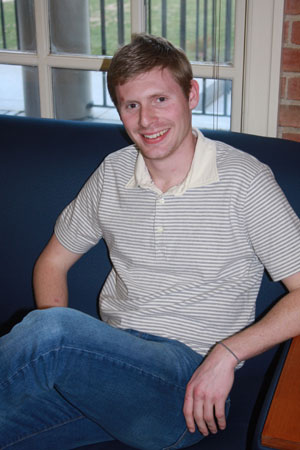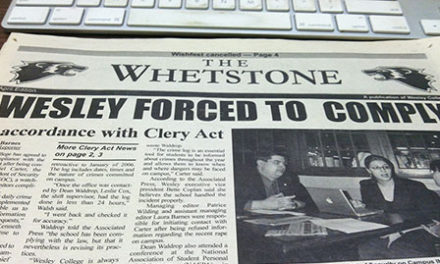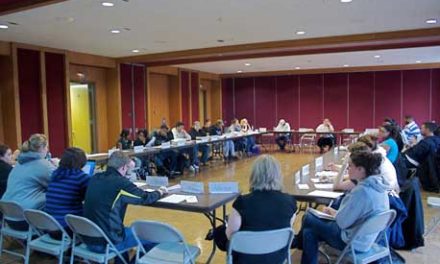SGA Executive Board for fall 2010
President- Tanner Polce
Vice President- Bryan Zarou
Secretary- Emilie Milcarek
Treasurer- Ann Wright
Sergeant at Arms- Josh Spivey
By Kim Manahan (Whetstone Staff Writer)
The voting process for the Student Government Association (SGA) elections changed when students cast their votes for the executive board online through the Wesley involvement site.
This helps with the percentage of people voting because it is available 24 hours, said Amberlyn Oldham, president of SGA.
“It may help commuters who may not be available from 10-2 [when the table is set up],†said newly-elected SGA president Tanner Polce.
This method allows votes to be tallied online rather than hand by hand as the paper ones were.
Voting online also eliminates hearsay and rumors of ballot-stuffing, Polce said.
“[The election] is not rigged in any way,†said vice president candidate, freshman Bryan Zarou. “There won’t be any Bush-Gore shenanigans going on here.â€
Nominations were still done by paper ballots.
Emails, flyers and digital signage helped advertise the elections, Oldham said.
Also, by doing the voting online, it utilized the Wesley Involvement Web site.
“It’s great because everyone who voted is now registered,†Zarou said.
New procedures in place
The SGA used a new elections procedure this year that was formed by sergeant at arms, Josh Spivey.
Congress and the executive board helped in the editing of it as well.
“We all came together and formed this piece,†Oldham said.
There were 35 people who worked on it, Polce said.
“[It is a] true representation on what students wanted,†he said.
Many of the new procedures were security related. It also allows students to have running mates.
There are rules about who is allowed to hold executive board positions.
Article V, section 1.2, of the SGA Constitution says, “No Executive Officer member may hold another Executive Office position on any other recognized campus organization or council.â€
The exception to this rule is an organization that holds less than six members, or if it is not recognized under the SGA.
For example, Polce holds an executive position in the Resident Hall Association (RHA), but since RHA is not a recognized organization, there is no conflict.
Campaigning this year was allowed only in designated areas and time.
In the new procedure, a list is given of how many fliers each candidate can place in each building. There also was a debate each candidate had to attend, which was open to the entire student body.
“A lot of the procedures were security-related,†Polce said.
With the new rules, two Elections Committee members must be at the voting table at all times, and there won’t be any candidates near the table during the time of voting, unless they are voting.
Vice Presidential Winner
Bryan Zarou became the next SGA Vice President on March 29 at the SGA congress meeting.
Zarou’s plans plans to increase involvement, advertisement and recrtuitment for congress.
“SGA’s congress is currently juniors and seniors,†he said. “We do need to recruit next year.â€
Vice Presidential Candidates
All executive positions ran unopposed this election except for the vice presidency.
Candidates who ran for the position included senior Christina White, freshman Travis Ragland and freshman Bryan Zarou.
All three had intentions of increasing student involvement if they were elected.
“I realized a lot of the kids are not involved in clubs,†Ragland said.
Ragland believes that this was the reason not so many students ran for executive board positions.
“I think it’s sad,†he said. “It just proves my point that kids aren’t involved. SGA’s a great resume builder.â€
At the University of Pennsylvania, a friend told me that everyone wants to be in the SGA, Polce said.
Wesley is diverse, he said. There are students who are proactive and students who don’t know.
“We can connect the political nerd to the person who doesn’t know what SGA is,†Polce said.
Zarou wants to increase advertisement and involvement as well.
At the debate he proposed that teachers should have papers put in their mailboxes every week so they could announce in class the events happening around campus.
“I would like to work with the student body,†White said. “I would like to improve the relationships between organizations.â€
We need recruitment next year, Zarou said. “It was [Oldham’s] speech at [freshman] orientation that got me interested.â€
“I wish more people would have run for other positions,†White said. “I feel like no one knew about it.â€





